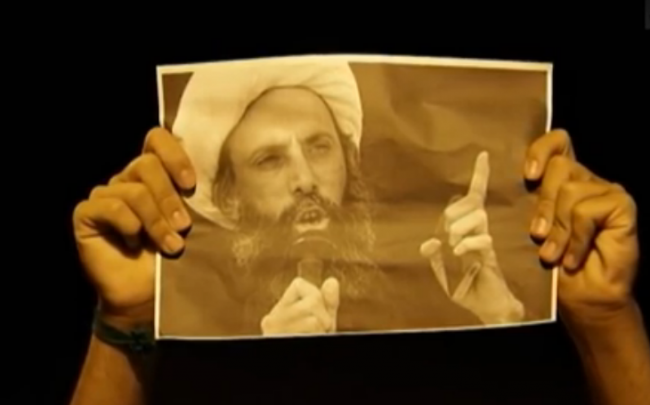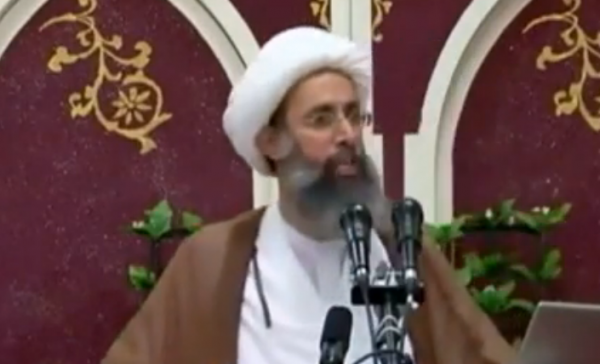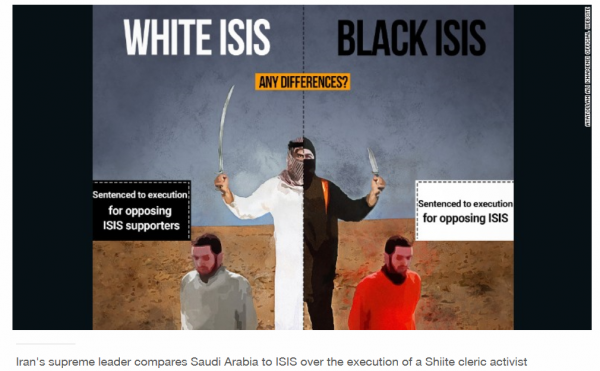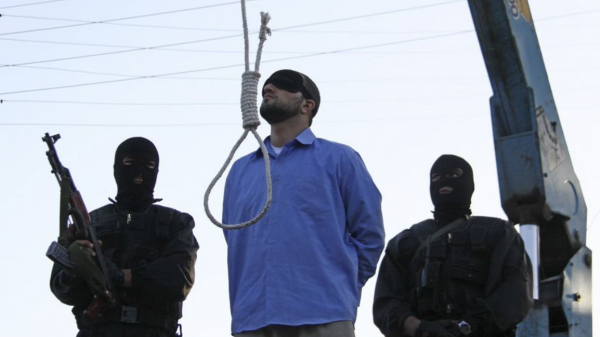Five Lessons from the Iran-Saudi Blowup
What a Popular Cleric’s Execution Says About the Middle East

The fallout from the execution of prominent Shiite cleric Nimr al-Nimr in Saudi Arabia on Saturday will roil the Middle East region for some time to come. Below, I review the recent developments since our last posts (see here and here) and discuss some of the lessons to be learned from this latest episode in the unraveling of the Muslim Middle East.
Saudi Arabia Cuts Ties with Iran
As we reported, Saudi Arabia has broken diplomatic ties with Iran. On Sunday afternoon, the Saudi Foreign Minister, Adel al-Jubeir announced at a press conference that Iranian diplomats had 48 hours to leave the kingdom.
Saudi Arabia’s Sunni allies have now rallied behind the Kingdom, joining Riyadh in either also severing or downgrading diplomatic relations with Teheran, deepening the sectarian divide in the Middle East.
Yesterday Sudan and Bahrain, which hosts the U.S. Navy’s 5th fleet, cut all ties with Iran. Then, the United Arab Emirates (UAE), home to hundreds of thousands of Iranians, downgraded relations.
The moves are the culmination of a tumultuous weekend which pushed the already frosty relations between Iran and Saudi Arabia to the breaking point.
As we highlighted in our posts, the sequence of events began when Saudi Arabia executed 47 people on Saturday. They had been sentenced to death on terrorism-related charges. The punishment was reportedly carried out across 12 provinces, in eight of them by beheading and in the remaining four by firing squads.
Most of the convicts executed on Saturday were reportedly Sunni jihadists who had fought for al-Qaeda’s Saudi branch or its successor, al-Qaeda in the Arabian Peninsula (AQAP). They included, for example, Fares al-Shuwail, known to once be al-Qaeda’s top spiritual leader. He had been in jail for over a decade.
But also in the executed group were four Shi’ites. Among them was the “most prominent opposition figure” for Saudi Arabia’s Shi’ite minority: firebrand Shia cleric Nimr al-Nimr. He was imprisoned since 2012, found guilty of incitement and for facilitating anti-government attacks, according to Saudi authorities, and sentenced to death in 2014.
Iranian officials condemned the execution, warning the kingdom that it would pay a “high price” for his death. Iranian Supreme Leader Ayatollah Ali Khamenei blasted the kingdom, saying “The hand of God will take vengeance against Saudi leaders”.
Awakening is not suppressible. 16/5/2015#SheikhNimr, #NimrAlNimr, #NimrMartyred pic.twitter.com/bVTz61FTDN
— Khamenei.ir (@khamenei_ir) January 2, 2016
Doubtlessly, unfairly-spilled blood of oppressed martyr #SheikhNimr will affect rapidly & Divine revenge will seize Saudi politicians.
— Khamenei.ir (@khamenei_ir) January 3, 2016
In Lebanon, Hezbollah threatened that the move would result in the monarchy’s “downfall”.
Then an irate mob stormed the Saudi embassy in Teheran, ransacking and torching portions of the building. In the Iranian city of Mashhad thousands of protesters also launched firecrackers at the Saudi consulate and pulled down its flag.
In the last 48 hours, Shiites across the world have denounced Nimr’s execution.
The tensions and hostilities aren’t over yet. Yesterday a Sunni imam in Alexandria, north of Babylon in Iraq, was killed in an apparent revenge attack. Several Sunni mosques in Iraq’s Shi’ite-majority Hilla province, about 50 miles south of Baghdad, were bombed. A man who worked at one of the mosques was killed.
Prominent religious and political leaders in Iraq are now also calling for the government to cut ties with Saudi Arabia, which ironically had just reopened its Baghdad embassy last week after closing it in 1990 in response to Iraq’s invasion of Kuwait.
Meanwhile, oil prices have risen more than two percent and stock markets across the Gulf dropped sharply. As I write these words, Saudi Arabia has announced a halt to trade with, and flights to, Iran.
Five Lessons
1. The International Community Rewards the Region’s Abusive Regimes
Over the last 24 hours, considerable disagreement over Nimr’s status as a dissident has emerged:
In the Arab world as well as the West, the discussion of [the] execution of Saudi Shi’ite cleric Nimr al-Nimr has been strident: Sunni Gulf states applaud the action as a step forward in the struggle against terrorism, Iran and Arab Shi’ites condemn it as part of a war on their sect, and in the West, Nimr has mostly been cast as a nonviolent opposition leader, unjustly imprisoned and wrongfully killed”.
So basically, from the standpoint of the Iranians (and many Western governments and human rights groups), Sheikh Nimr was a political dissident, convicted on “trumped up terrorism charges” merely for encouraging largely non-violent protests in Saudi Arabia’s long repressed Eastern Province.
But for the Saudis, according to an analyst writing for the Foreign Policy Research Institute, “Nimr [was] the Shi’ite equivalent of Sunni members of ISIS and al-Qaeda whom they believe to have blood on their hands”. To them, he was an unrepentant insurgent who continued to openly advocate for the use of force to topple the Saudi regime.
To be sure, who Nimr was and what he did will continue to be debated for some time although, given all the evidence, it’s a stretch to view him as a “peaceful preacher of reform”.
But the controversy over Nimr sidesteps the larger issue: Saudi Arabia’s ongoing authoritarian repression, its marginalization of a disaffected Shiite citizenry, and the international community’s shameful tolerance of it.
Even if Nimr’s execution is considered within the context of the Kingdom’s legitimate effort to combat terrorism by groups like al-Qaeda and Iran and its proxies, Saturday’s mass execution was the largest in Saudi Arabia since 1980 and follows last year’s “two-decade high in capital punishment”.
It’s a miserably poor record. Still, it hasn’t stopped the Saudis from serving on human rights committees at the UN.
Rare: UN issues statement of "concern" on Saudis. Typical: no condemnation. Saudis chaired @UN_HRC panel in 2015. https://t.co/SXC0e0f7Vr
— Hillel Neuer (@HillelNeuer) January 3, 2016
Writing on Sunday for Commentary, Michael Rubin puts the point well:
Nimr’s execution — and the bloodshed which will inevitably flow from it — should be cause for reflection by United Nations Secretary-General Ban Ki-Moon. After all, it was on his watch — and after Nimr’s arrest and death sentence — that the United Nations not only allowed Saudi Arabia to take a seat on the Orwellian 47-member UN Human Rights Council but also appointed Saudi Arabia to chair the Consultative Group, an elite UN human rights panel which selects applicants to several dozen UN human rights posts. Ki-Moon and other UN cheerleaders can cite procedure and explain the moral and cultural equivalence which has done so much to drive a wedge between the vision of the UN’s founders and the reality of the organization today, but the simple fact is that allowing Saudi Arabia to use UN positions to launder its human rights credentials has convinced senior Saudi leaders that they literally can get away with murder. It’s time for some serious introspection at the UN and among those in the White House and Congress who, with rhetorical support and funding, pumped new life into a corrupt and venal body that, rather than protect human rights, instead has become a club for abusers”.
2. The Region’s Human Rights Abusers Always Point Fingers at Others, Never at Themselves
Over the last few days one notorious human rights violator in the Middle East has attacked another for being a repressive regime. It proves that in this region of the planet the pots are always calling the kettles black.
#Iran, world's greatest executioner per capita, for crimes like insulting the memory of Ayatollah Khomeini, very angry at #Saudi executions.
— Hillel Neuer (@HillelNeuer) January 2, 2016
Iran condemned Saudi Arabia for being just like ISIS on Twitter and official websites:
Meanwhile, “Iran executes three Iranians every day”, imprisons whoever disagrees with the regime, severely represses religious minorities, and hangs gays from cranes.
According to Amnesty International, Iran is the most prolific executioner in the world after China. It also tops the global list statistically for executions of juvenile offenders.
Since the election of so-called “moderate” President Hassan Rouhani in 2013, the number of executions has gone markedly up. According to Amnesty, Iranian authorities executed nearly 700 people in the first half of last year alone.
3. The U.S. Needs to Stop Apologizing for the Region’s Challenges
As noted this weekend by Aaron David Miller, Vice President of the Woodrow Wilson International Center for Scholars, “it would be irrational to conclude that U.S. actions and inactions hadn’t contributed to the messes in the Middle East”.
Put simply, the disastrous Iran Deal has deepened the rift between Sunnis and Shi’ites in the region. As Josh Rogin and Eli Lake wrote yesterday in a thoughtful op-ed:
At the root of the problem for Sunni Arab states is the nuclear deal reached last summer by Iran and Western nations. When the White House sold the pact to Congress and Middle Eastern allies, its message was clear: Nothing in the deal would prevent the U.S. from sanctioning Iran for non-nuclear issues. Yet that has not been the case”.
Basically, the Saudis are now convinced that they can no longer rely on the U.S. security umbrella and must “compensate” for the perceived U.S. disengagement from the region with a new assertive foreign policy to counter Teheran.
It puts Nimr’s execution in a whole different light.
Writing for Reuters, Angus McDowall remarks that the execution
seemed to be an attempt by the government to reassure conservative Sunnis that Saturday’s executions [of mostly Sunni ‘inciters of violence and terrorism’] did not mean Riyadh would stop championing their sect against what it portrays as Shi’ite aggression across the Middle East”.
Still, Nimr’s execution and the region’s stormy reactions to it can’t all be pinned on to the Obama administration’s lack of leadership. The rivalry between the Al Saud ruling family and Iran’s mullahs has been ongoing for decades, while the Sunni-Shi’ite schism is ancient.
Good food, bad blood, endless schisms #ExplainTheMiddleEastIn6Words #הסבר_המזהת_בשש_מילים
— Omer Benjakob (@omerbenj) January 4, 2016
Miller rightly points out that:
the region’s challenges are rooted in internal, religious and sectarian problems that are not amenable or conductive to U.S. military power or political persuasion; and they are spread among allies who have their own needs and agendas…whatever responsibility U.S. action or inaction bears for the state of the Middle East, it pales next to that of a region that lacks leadership, representative institutions, moderate ideologies, a commitment to functional governance, and a willingness to face its problems”.
4. The Middle East’s Muslims Will Remain Silent Over the Genocide of its Christians
In numerous recent posts (see, for example, here and here) we’ve highlighted the world’s shocking indifference to the plight of Christians in the Middle East, and President Obama’s inaction on the issue.
Tragically, the fierce responses to Nimr’s execution suggest that the region’s beleaguered Christians shouldn’t expect too much in the way of support and assistance from their Muslim neighbors—even those not directly responsible for the killing and persecution.
Christopher D. Burton’s withering critique in yesterday’s Breitbart rams home this heartbreakingly sad truth:
…on January 2, 2016, an epic war of words broke out between leaders of nations. Violent protests, riots, Molotov Cocktails, threats, and now fire at the Saudi embassy in Tehran. The Arab world has come undone over the death of one Muslim Cleric. No life, or any unjust death, is insignificant, and the details of Arab Spring proponent Sheikh Nimr’s life and the accusations against him are, and will be debated around the world, yet the scale of silence, neglect, indifference, and hypocrisy regarding the death of many others in their midst, once again, is staggering. Think about that, the scale of silence. Can pitch black be any blacker? Can a back turned be any broader? Deafening”.
5. No Matter What Goes Wrong in the Middle East, Israel is Blamed
Ever since Nimr was sentenced to death, pro-Iranian Shiite groups in Bahrain and Iraq have blamed America for his imprisonment and threatened attacks if his death sentence was carried out.
Yesterday, for good measure, an Iranian commander threw the British and the “Zionists” into the mix of guilty parties.
Speaking at a conference in Iran, Brigadier General Mohammad Reza Naqdi, commander of the Basij militia of Iran’s Revolutionary Guards, reportedly declared that:
Sunni and Muslims alike will avenge Nimr’s blood and in particular take revenge against the main factors responsible for his death: the UK, the U.S. and the Zionist entity”.
Typical.
https://twitter.com/Yair_Rosenberg/status/683462203689832448
https://twitter.com/GidonShaviv/status/683753832870969344
https://twitter.com/Yair_Rosenberg/status/683422143581913088
Miriam F. Elman is an associate professor of political science at the Maxwell School of Citizenship & Public Affairs, Syracuse University. She is the editor of five books and the author of over 60 journal articles, book chapters, and government reports on topics related to international and national security, religion and politics in the Middle East, and the Israeli-Palestinian conflict. Follow her on Twitter @MiriamElman
 DONATE
DONATE
Donations tax deductible
to the full extent allowed by law.













Comments
Am I reading about the Religion of Peace?
Nice review and well written. Too bad it won’t appear in a major US newspaper.
Stevewhitemd: Thank you!
Good post. I might add:
#6 – All of this is precursor to a coming nuclear arms race in the Middle East, all part of the ‘Obama doctrine’.
The Saudis did not specially decide to execute this Iranian-connected cleric. I am not clear that anyone thought Iran would have this reaction.
This was partof achange of plolicy toward more executions brought about by:
1) A change of government personnel resulting from the death of the king last year.
2) Less Saudi worry about human rights and democracy. The Saudis are getting tougher about internal security. The elections for some offices proceeded on their own momentum – and besides that’s on a differentt track, with different people in charge.
Onew extremely bad trend, that started with the Saudis about 2011 and was quickly adopted by Bashir Assad in at a time when the Saudis were still trying to advise him, is the practivce of punishing doctors who treat political dissidents shot by police. Doctors were Bahrein were punished like that and this is becoming the new mormal for dictatorships. (after all the purpose of firing live bullets, in their minds, is to get some people killed and seriously wounded (not just to disperse the crowds) and doctors treating people undermines that.
Spengler says that the executions are a sign the Saudi regime is very shaky:
http://atimes.com/2016/01/saudi-arabia-in-policy-hell/
” I am not clear that anyone thought Iran would have this reaction.”
The saudi’s knew exactly the reaction iran would have.
“…punishing doctors who treat political dissidents shot by police.”
If Hillary Clinton is elected, that will be an Obamacare executive order. Then again, Obama might issue it himself – he sure has time, being Paul Boehner and GOPe are all bent over, pants down, holding their ankles, though probably lining their pockets in the process.